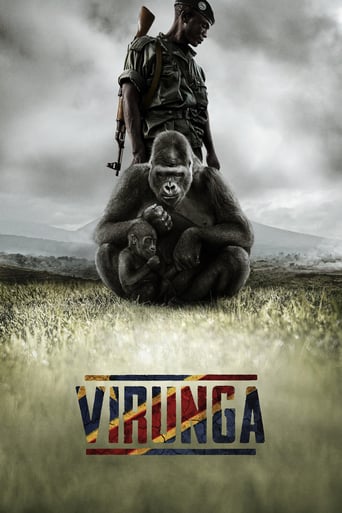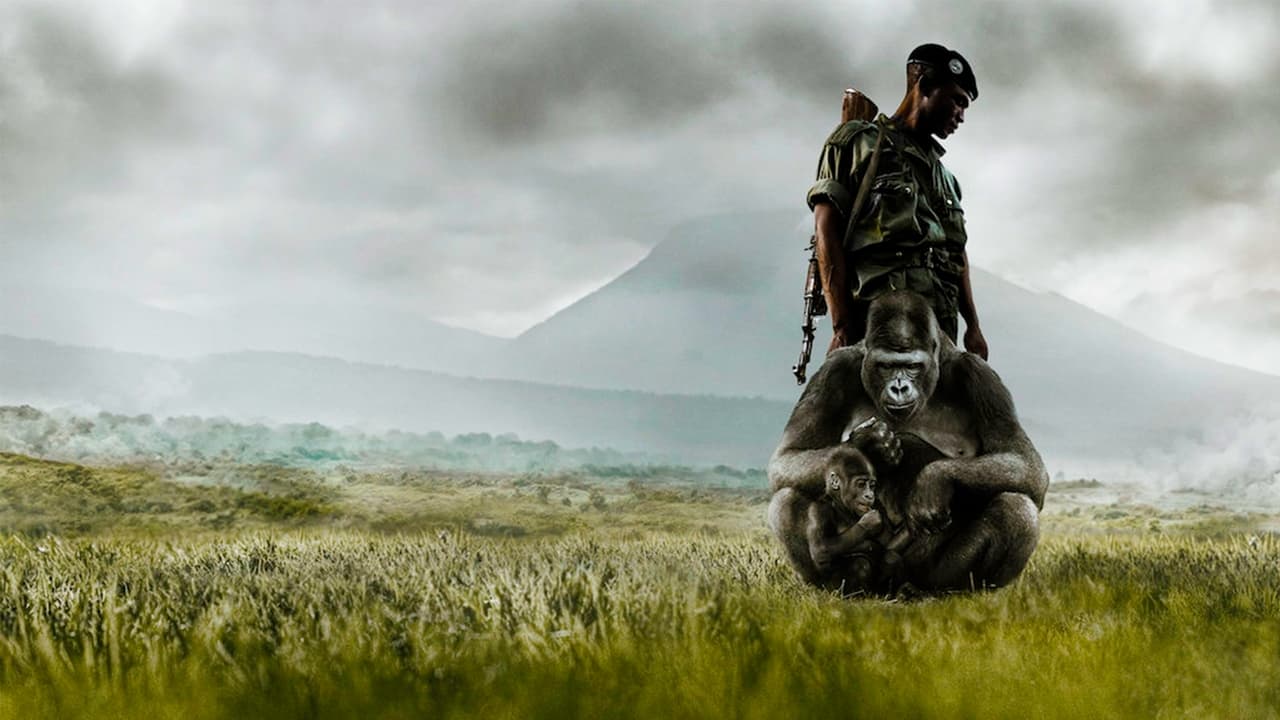Jithin K Mohan
Starting with an introduction to the history of turmoils in Congo this documentary tells the dramatic story of those who are trying to exploit and suck out everything from the country focusing on the Virunga National Park. The undercover footages are much more theatrical than shown in films since we know these are real and the kind of dialogues we hear in movies which we think as an exaggeration for dramatics seem to be much short of what the real villains are capable to churn out.
Paynebyname
So I recently got Netflix and scrolling through the available features, I noticed the Oscar nominated Virunga, a documentary about Gorillas in Congo. I assumed that being nominated for an Oscar would mean that it would be a compelling and absorbing documentary offering something new.Unfortunately it was none of these. It seemed to be chock full of seen before and stereo typical, tick box African scenes: Impoverished children running along with a tyre and a stick, women carrying huge loads balanced on their head, armed militia with cumbersome rocket launchers walking through the bush, yawning hippos, sweeping aerial shots of lush vegetation, gorillas looking forlornly at the camera and refugees fleeing along never ending roads.The documentary had very little direction or focus. The guy in charge of the park rangers didn't seem to have much 'presence' about him and the constant assertions that these people were prepared to lay down their lives for the park and the gorillas was all a bit muddled. At one point they are preparing their weapons and supplies for when the rebels roll into town and the next minute, he's saying that when they come, we'll have to leave. Were they prepared to die defending the park/gorillas or simply die alongside them? Were they part of the Congolese army or a privately funded militia? The programme wanted to make out that they were defending the Alamo but he never walked around, and his colleagues never exhibited, an air of heightened battle readiness. Granted it's all about remaining calm but it certainly didn't give the impression of the wild west.Likewise the whole SOCO 'conspiracy' seemed very forced and under-developed. I couldn't work out why a SOCO employee would be so keen to spill the beans about the company, and later on introduce a mercenary to the female reporter, when he knew that she was a journalist. Did he really think she would keep it off the record? What was his motive for telling her everything? It felt strange that the makers were so keen to paint the company based in one of the former colonial powers as the dreadful bad guys but turned an almost blind eye to the Congolese government that gave SOCO the license to begin the oil exploration. What message are they trying to send? That the evil corporations are the puppet masters for the Congolese government? That the Congolese are too stupid or inept to control their own destiny? Surely if it wasn't SOCO, it would be another oil company that would be offered the concession to look for oil? Why is the dirty thought of profit, the exploitation of a countries resources and the invasion/destruction of the national park only being laid at the door of the western business? Is it that the Congolese government can do no wrong or would singling them out for criticism be a lot more uncomfortable than pinning it all on the pantomime British bad guy? Finally, the documentary was a little confusing in what was actually happening and when. M23 were attacking the area and the Congolese army were pulling out but then the army were taking up defensive positions around the park. Did the park fall into their hands? If so, why were M23 happy for it to remain open and have an independent military force existing within its new sphere of influence? It really was one of those documentaries where you realised about half way through that the only decent summation you were going to get, would be at the very end. Although this revealed some blatant corruption and intimidation against the main park commander, it unsurprisingly was made up of responses just from SOCO. I'm intrigued to know what the official responses from the Congolese government were.Although the plight of the Gorillas and the National parks is an important one, I do feel that the makers are trading on the importance of the issue rather than fully raising their game and putting together an excellent documentary to promote the cause.
Nicole of ArchonCinemaReviews.com
Virunga is a well intentioned documentary that will hopefully garner attention for the clashes occurring in the Congo.The Oscar nominated documentary Virunga explores the conflict for natural resources in the Central African country of the Democratic Republic of the Congo and the unintended but deadly consequences for the UNESCO-designated Virunga National Park, a World Heritage Site, caught in the middle of the skirmish.The documentary, directed and written by Orlando von Einsiedel, says Virunga is about the brave individuals that act as an army to protect the Virunga National Park from poachers. In reality, the film not only explores the protection efforts of the mountain gorillas but the harmful effects of civil unrest on the DRC. Along with journalist Melanie Gouby, von Einsiedel's Virunga goes undercover to reveal the negligent motives of British oil company SOCO International.As a documentary, Virunga is interesting, eye-opening and concerning but not necessarily novel nor especially comprehensive. The information relayed to audiences is not from experts or top players in the controversy of the park, wild life or even political landscape. Instead, most of the information highlighted and showcased are simply from first hand experiences as the civil war reignites and from a few key figures who are employed by the Virunga National Park.Virunga is well intentioned but ultimately slightly faulted documentary. It is informative, but not substantially so. There are plenty of filler shots of babies crying and the beauty of the African landscape but these scenes add no significance. Virunga ends up feeling like a History Channel or National Geographic special – not a bad thing, but not the same caliber as a feature documentary film.The lack of hindsight and conclusion of the civil siege in the Democratic Republic of the Congo makes for an unstructured film where it appears that the filmmakers were learning the story as they went – leading to a lack of vision and inability to edit the film into a cohesive non-fiction narrative.Please check out our website for full reviews of all the recent releases.
annepeter
The film was shot by a very brave group of people in what is a dangerous area. The pictures of the Park are beautiful and the those of the gorillas are captivating. I lived in DRC for five years, but mainly stuck to Kinshasa.I was surprised by the historical inaccuracies in the initial background:the film states that other countries in Africa were run by European Governments, but that Congo was the only one run by companies. This is not correct. King Leopold convinced the other European Powers to grant him the Congo which he would 'run for the benefit of its people'. In fact he ran it entirely for his own financial benefit and this probably resulted in the death of 10 million Congolese (see 'King Leopold's Ghost' by Adam Hochschild).the film goes on to state that Patrice Lumumba, Congo's democratically elected Prime Minister at Independence was killed by mining companies. This is also not true. Patrice Lumumba made himself unpopular with the Belgian Govt with his speech at the Independence ceremony. He made himself unpopular with the American Govt with his approach to the Soviet Union for assistance. The CIA was briefed to arrange his death (see 'Chief of Station, Congo' by Larry Devlin) and the Chief of Station (i.e. the head of CIA, Congo) was bizarrely provided with poisonous toothpaste to be introduced into Lumumba's bathroom - but this was not deployed.The Belgian Govt took a direct role in Lumumba's murder with the Belgian Police Commissioner Frans Verscheure directing the firing squad (see 'The Assassination of Lumumba' by Ludo de Witte).It was not mining companies that killed Lumumba, it was the Belgian and US Governments.I can see that the film's makers wanted to present a uniform story where evil mining companies have been responsible for all the ills in Congo's past (and present), but this is not correct and this dishonesty detracts from the film.The film's makers have downplayed the subsequent (11 June 2014) decision by SOCO to withdraw from the Park and not to return unless 'approved by UNESCO and the DRC Government'. The film makers may not like SOCO, but their undertaking seems pretty clear and categoric. I can't see UNESCO inviting them back in.And part of the reason for that is the reality gathered and presented by the film. They, together with the campaigning efforts of WWF (likewise undervalued by the filmmakers) should get all due credit for saving this beautiful Park.




 AD
AD


